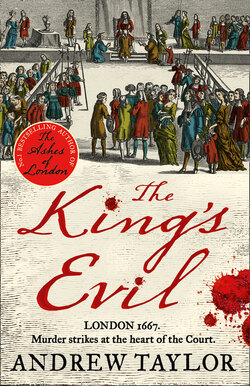Читать книгу The King’s Evil - Andrew Taylor, Andrew Taylor - Страница 15
CHAPTER FOUR
ОглавлениеON SATURDAY AFTERNOON, as chance would have it, I was kept later than I had expected at Whitehall. There was a crisis in the office. Much to Chiffinch’s irritation, I spent the majority of my time working under Mr Williamson, the Undersecretary to Lord Arlington, the Secretary of State for the South and one of the King’s most powerful ministers. Mr Williamson’s responsibilities included the publication of the London Gazette, the government’s newspaper. Under his direction, I shouldered much of the day-to-day burden of editing the material, seeing it through the press and ensuring it reached its readers.
In London, the Gazette’s distribution relied heavily on a group of women who carried the newspapers to the taverns and coffee houses of the city, and also delivered them to the carriers who took them the length and breadth of the kingdom. Over the last few weeks there had been problems of late delivery or even no delivery at all. These were probably due to the usual causes of death, disease, drunkenness and simple unreliability. There was also the fact that we paid the women a pittance, which was often weeks in arrears. But Lord Arlington wasn’t interested in the reasons. He blamed Williamson for the failure, and Williamson blamed me.
When at last I was able to leave the office, I took a boat from the public stairs at Whitehall – fortunately the tide was on the ebb – and went by water to Charing Cross. The sun was low in the sky, slanting through a gap in the clouds.
Outside the New Exchange, the Strand was packed with waiting coaches and sedan chairs, reducing the flow of traffic in both directions to fitful trickles. Aggrieved drivers struggled towards the City or upriver to Whitehall or past the Royal Mews towards Hyde Park. Those on foot were making better speed.
The clocks were already striking six as I entered the building. Since the lamentable fire last year, which had destroyed the shops of Cheapside, the old Royal Exchange in the City and so much else, the New Exchange was busier than ever. The world came here to buy and sell. Everything the heart could desire, the proud boast went, could be found under one roof. You could purchase all the luxuries of the globe without having to get your feet muddy, your clothes wet, or your ears assaulted by the vulgar cries of the street.
I forced myself to slow down – people sauntered in the New Exchange: to hurry was to draw attention. The shops were arranged in long lines that faced each other on two floors. I made my way to the stairs. The upper galleries were even busier than those on the ground floor.
Mr Kneller’s shop was larger than most and equipped with a wide mullioned window, the better to allow customers to inspect the wares for sale. Much of his stock was imported from France and the Low Countries.
I hesitated on the threshold. The last of the sunlight slanted through the panes in broad stripes that brought to life the silks and lace in its path. The shop was thronged with people, men and women; the air was heavy with perfume, and filled with the murmur of voices and the rustle of skirts. The proprietor’s wife, a pretty woman of about thirty, was showing a delicate spray of lace to a richly dressed gentleman with a face like a horse. The gentleman was more interested in her than in her lace. For an instant her eyes flickered towards me and then returned to her customer.
‘You like the look of her, don’t you?’
My head jerked to the left. Cat was at my elbow, looking up at me. She wore a light cloak and a hat that shaded most of her face.
‘Nonsense,’ I said, instantly defensive. ‘I was looking for you.’
‘You’re a liar, sir,’ she said. ‘Like all men.’
